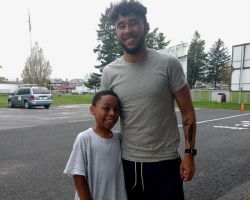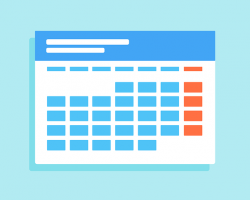
Right now, more than 240 children and teens are being mentored through Big Brothers Big Sisters of the Lehigh Valley (BBBSLV), a local chapter of the national nonprofit.
The organization pairs adult volunteers, or “Bigs,” with youth participants, or “Littles,” of the same gender to develop one-on-one relationships through activities, such as playing games, trying a sport, or talking over lunch.
It’s a popular program in the Lehigh Valley, with demand—a waiting list of 200 names, more than two-thirds of them boys—far exceeding the supply of caring adult role models ready to give their time and attention.
“One of the things that historically all Big Brothers Big Sisters agencies across the country struggle with is having enough Big Brothers for the number of boys who want to participate,” says Susan Bartels, CEO of BBBSLV. “So we are not atypical. … We’re just trying to fill that mentoring gap and identify solutions to increase the number of men interested in volunteering.”
As part of that effort, Bartels reached out to Lehigh’s University’s Enterprise Systems Center (ESC) last fall. The ESC, which is part of the P.C. Rossin College of Engineering and Applied Science, pairs students with companies looking for solutions to real-world industry problems. Students exchange their expertise in areas such as systems engineering, operations research, analytics, and management science for hands-on, experiential learning and leadership development opportunities.
Increasing the potential for growth
For nearly 50 years, BBBSLV has partnered with parents, schools, and community members to help match Littles with Bigs. Littles are 7 to 18 years old and meet with their Bigs for a few hours two to four times a month.
“We believe all children have potential,” Bartels says, “and it is our job to defend their potential, so we’re looking for those who will invest their time to help the children reach their greatest possible futures.”
Although the Big Brothers Big Sisters concept is easy to understand—young people benefit when they have a trusted adult to lean on and look up to—the existing process to launch a mentoring relationship was challenging for both the applicant and the organization.
The adult had to first complete an application to express interest. After the nonprofit was notified, office staff and the applicant played phone tag or sent multiple emails back and forth to schedule an in-person interview before moving on to thorough background and reference checks. If successful, the applicant was matched with a Little. All of that took time: 30 days, on average, for a volunteer to go from inquiry to the interview stage, and about 160 days from inquiry to being matched.
The lengthy timeline, Bartels says, contributed to people dropping out of the process or inactive applications being closed because of multiple failed attempts to make contact.

"Little" Armani was recently matched with his "Big," Reece. Boys represent two-thirds of the young people waiting to be matched with a mentor through Big Brothers Big Sisters of the Lehigh Valley.
Yet despite the system’s inefficiencies, the number of volunteers has been growing: The 2018 total was up 68 percent over the previous year. Bartels recognized that if she could streamline the process, she could get even more mentors on board, especially men.
Enter the ESC project team from Lehigh. The students—two studying industrial and systems engineering (ISE) and 12 pursuing marketing, finance, or economics majors—set out to reduce the overall timeline to 75 days, while increasing the organization’s visibility among the demographic groups represented on the waitlist.
Faculty mentor James Maskulka, an associate professor of marketing in Lehigh's College of Business and Economics, led the team with support from the ERC’s Robert Gustafson, senior fellow for leadership development, and advisor Greg Paul. Marketing mentor Scott Kress, ISE mentor Tom Stine, and BBBSLV board member Scott Quilty attended team meetings and the final presentation.
The undergraduates studied two objectives: how to make the program’s workflow more efficient so fewer people drop out and how to attract more adult men to volunteer—specifically African American, Hispanic, and Latino millennials.
Finding answers in automation
ISE majors Kylie Ginsberg ’19 and Rob Avery ’19 reviewed BBBSLV’s internal processes step by step to identify the holdups and suggest remedies.
Losing contact with a potential Big was the most common breakdown, which made sense to the students after they reviewed communication records.
“We went through phone logs and every interaction they had with a Big—they called at this time, they emailed on this date—and some of these spanned over a course of a year just getting in contact,” Ginsberg says, “so we wanted to streamline that part of the process for them.”
By automating communications and scheduling, BBBSLV employees’ time could be better spent on tasks central to the organization’s mission, such as relationship building. Ginsberg and Avery researched tools that could make automation possible, including Matchforce for communication and Acuity for scheduling.
Prior to the project’s start, the students learned that Matchforce, a spinoff of the Salesforce customer relationship management platform, was going to be implemented nationwide by Big Brothers Big Sisters of America in February 2019.
Avery says Matchforce allows prospective volunteers to fill out the entire application online and automatically sets up a profile, cutting out the time-consuming back-and-forth associated with legacy system. With Matchforce, both the potential volunteer and personnel can view the status of the application, reducing any confusion and making it easier to gauge interest.
“Matchforce is going to be completely revamping their enrollment process and making it a lot more simple,” Avery says.

By automating tasks such as scheduling, the industrial and systems engineering students found, the organization could reduce the hours employees spent playing phone tag and devote more time to efforts more closely aligned with the Big Brothers Big Sisters mission.
Because Ginsberg and Avery knew the Lehigh Valley chapter was already preparing to implement Matchforce, the students wanted to identify other programs that would integrate well with it, such as Acuity Scheduling.
The students suggested this scheduling tool as a way to reduce the hours employees spend playing phone tag.
Acuity allows the volunteers to set up scheduling themselves, choosing from available meeting times and sending automatic confirmation emails.
A marketing-engineering crossroads
The marketing students separated into three working groups focused on data analytics, market research, and social media and promotions.
Vanessa Snyder ’19, an accounting and marketing double major who focused on data analytics, says the project’s two overall objectives, attracting more adult men to apply and creating a more efficient application process, were interdependent.
“Our improvements to the marketing efforts sought to increase the volunteer pool, so their system would have to be efficient enough to handle the increase,” Snyder says. “That’s where there was a merge between marketing and ISE [industrial systems and engineering].”
To bolster volunteer recruiting, the data analytics team investigated two approaches: Targeting community colleges to attract students, particularly local young men, who would likely fall into the target age and demographic groups, and making inroads with corporations that might add the nonprofit to their community outreach efforts. Their research favored the latter approach.
The students suggested that BBBSLV create a “sharing” program for corporations, enabling a group of two to four employees to divide the responsibilities of mentoring one Little.
The social media and promotions team recommended working with restaurants and venues to sponsor or partner with the nonprofit, offering discounts for Bigs and Littles and announcing them on social media to get the program on the radar of young men.
The students also proposed the idea of creating storytelling videos that could be shown to incoming mentors to better explain the role of a Big and manage expectations.
The market research group surveyed current and former Bigs about their experience and the application process. Through these interviews, the group concluded that the majority of interviewees thought the current application process was long and confusing, but they also said the volunteer experience exceeded expectations and left them feeling like they had made an impact on their Little’s life.

Other marketing students involved in the project included Jane Burke ’20, Anuroop Alberts ’19, Sara Fuertes ’19, Kiki Kidd ’19, Jonathan Schuette ’20, Lorraine Brabant ’19, Daniela Zito ’20, and Maria Vargas ’19. Finance majors Conor Leahy ’20 and Jack Hagan ’20 and economics major Shannon Carroll ’20 were also on the team.
Elements of the project changed a few times over the course of the project, says Maskulka, the team’s faculty advisor, but the students did a remarkable job adapting—flexing skills they’ll rely on in the real world.
The value of this project, and others like it offered through the ESC, he adds, is in the experiential learning that students can’t get from sitting in a lecture.
“There’s no textbook example for [this kind of project] for me or anybody,” Maskulka says.
Maskulka says the BBBSLV representatives and the faculty advisors were “blown away” by the students’ presentation.
“The suggestions that the students made and the ideas that they had are invaluable, especially if you think about the next generation, millennials and younger, [the organization] has to be more tech savvy,” Bartels says. “We have to become more efficient otherwise we are going to lose even more potential recruits.”
Bartels says she is optimistic about the technologies that the students reviewed and believe the programs will improve the process. BBBSLV is floating the “sharing a Little” idea with a few local companies, she says, and she expects the students’ efforts will help ramp up volunteer recruiting.
Though Bartels admits it will be difficult to eliminate the long wait for Littles, the CEO keeps her focus on making matches—knowing that each one has the potential to make a life-changing impact.
—Madison Hoff '19 is a student writer for the P.C. Rossin College of Engineering and Applied Science
